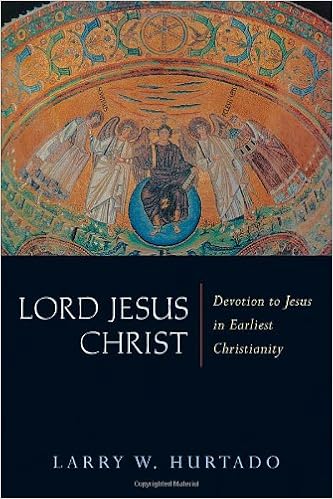In Part 6 we tracked the development of the Gentile inclusion process, from Peter addressing Jews from all nations in Acts 2, through understanding (and rejoicing) that non-Jews could be partakers in the great eschatological people via their legitimate receiving of God's great outpouring of his Spirit, to the eventual dawning in Galatians that the scope of Christ's salvation for his People of God was far wider - far greater - than Torah observance of circumcision.
Before advancing in Hurtado's chapter today in Paul, perhaps I could just add in the tension enhanced by Matthew's later addition in Matthew 5:18: "For truly I tell you, until heaven and earth disappear, not the smallest letter, not the least stroke of a pen, will by any means disappear from the Law until everything is accomplished." (NIV). So, hopefully it is starting to become more obvious as we allow Hurtado to immerse us in the first-century world, just what a whopper of an issue male circumcision was to the flourishing Christian movement.
Remember how in Chapter 1 we surveyed Hurtado's general thesis? We looked at his four major reasons that helped shaped Christian worship the way it did, and I praised it for its clarity. We had (the rather epic) Jewish monotheism, Jesus himself, religious experience and the religious environment. Here now Hurtado dips briefly into this model and asserts that for Paul indeed Jesus was this ultimate model for Christian living: "Jesus also functions as the inspiring model of the ethical qualities that are to characterize the present life of the redeemed and of the eschatological outcome of their redemption as well." (p. 134)
The section I want to focus on today is simply entitled "Binitarian Worship". Readers might remember that in the first series I had a post entitled: What does Hurtado mean by "binitarian"? I don't want to re-hash all of that here, but I'd like to give a shout out to blog reader, Richard Wilson, who astutely pointed out in a comment he left on one post that Hurtado has distanced himself over the last decade or more separating us from this important 2003 publication Lord Jesus Christ over this term, preferring to speak these days more of "dyadic worship". This is indeed evidenced over the exchange I had with Hurtado concerning his differences with Dunn here and here, alsoace given to Jesus in Pauline Ch in the first series. Good spot Richard! This problem of quite how we describe this early Christian worship is indeed not satisfactorily solved by calling it "binitarian". Binitarian sounds a lot like trinitarian-minus-one. Trinitarianism itself suffers from a lot of ambiguity, but given its ultimate form of the Triune God, then we could indeed agree that Hurtado's move away from binitarian to be a good one. Our author is certainly not implying that for our first-century founders that God himself is binitarian, otherwise his use of "both" would be entirely redundant: "The christological material we have surveyed here reflects an impressive... place given to Jesus in Pauline Christianity. As Kreitzer and Richardson have shown, in Pauline Christianity we see a remarkable "overlap" in functions between God and Jesus, and also in the honorific rhetoric used to refer to them both." (p. 134)
What I can say in summary and in strong agreement with Hurtado throughout this part is to assert the following: Is it not extraordinary that in all of the Pauline correspondence, despite all the issues that he addresses, that the centrality of Jesus and his overlap in functions with God are never critiqued? Hurtado goes into some detail to attempt to demonstrate that this would have included the earliest, Aramaic-speaking followers of Jesus themselves.
Worship
I am particularly pleased with what follows. I am a bit of a stickler for detail, as my queries on the precise definition of "binitarian" have probably shown. This time, however, on the question of "Christ devotion", which is clearly demonstrated, Hurtado is going to take head on the challenge (particularly from the likes of Dunn) that this should not be overlapped with how we might define "worship". Does the devotion to Christ reflected in Paul's letters really amount to "worship" in the sense of reverence directed to a deity? (p. 137) Here, Hurtado throttles up to full power and unleashes dense summaries of a string of publications he has published over the years that demonstrate the unique and divine status and "programmatic inclusion" of Jesus alongside the one true God of the Israelites. He is able to compellingly sweep aside allusions to occasional alternative intertestamental Jewish figures who had received some honorific recognition, or some sort of emergence of Jesus in the pagan sense of the Roman religious context of the time, highlighting the consistent "constellations" of practices evidenced and assumed by this earliest extant Christian writer, Paul.
In my next post, we'll see what Hurtado has to say about prayer in particular, which I hope should cause us who believe in Christ and the Father to reflect afresh about how we address them in light of the earliest Christian practice.


No comments:
Post a Comment
Thanks very much for your feedback, really appreciate the interaction.